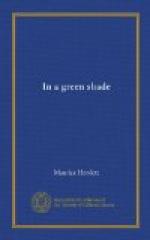The real Ettrick Shepherd was better than the Noctes can make him. Lockhart gives a delightful account of his first visit to Walter Scott in Castle Street—his first visit, mind you. He is shown into the drawing-room and finds Mrs. Scott, disposed, a la Madame Recamier, on a sofa. His acuteness comes to the aid of his bewilderment, and he is quick to extend himself in similar fashion upon the opposite sofa. In the dining-room he was much more at his ease. Before the end of the meal he had his host as “Wattie” and his hostess as “Charlotte.” Next day he wrote to Scott to ask what he might have said, and to offer apologies if needful.
A remark put into his mouth by North, that he could “ban” Burns for having forestalled him with the line—
The summer to Nature, my Willie to me!
set me wondering wherein consists the true lyrical magic. In that line of Burns’s, clearly, it lies in the harmony of lyric thought and lyric lilt. In—
Come away, come away, Death,
it is in the lilt alone. One thing only about it is sure, and that is that the diction must be conversational. There will be tears in the voice, but the voice must be that of the homely earth, never of the stage, never of the pulpit If you agree with that, you will have to cut out practically all the poets from Dryden to Cowper, Gray and Collins among them; for Gray has a learned sock, and hardly allows familiarity when he is elegising Horace Walpole’s cat. But Shakespeare proves it, Ben Jonson proves it, and all the good poets from Wordsworth. Burns had the vernacular to help him, and for the most part a model to steer by. All Lowland Scots, lads and lassies, wail, and occasionally howl, in his songs. The first two lines of that one envied by Hogg run:
Here awa, there awa, wandering Willie,
Here awa, there awa, haud awa hame!
and of these the second is traditional, altered only in one word. Burns writes “haud awa hame” instead of repeating “here awa”—and improves it. Shakespeare used the King’s English, but never shirked a racy idiom. Here is a good instance from the Sonnets, and from one of the greatest of them, “Farewell, thou art too dear.”
Thus have I had thee as a dream doth flatter—
In sleep a king; but waking no such
matter.
You might call that a slang phrase and be right.
There are other cases, and many; some where he goes all lengths, and one at least where he goes beyond them. But to leave Shakespeare, for a perfect example of passion married to common speech, commend me to—
Since there’s no help, come let
us kiss and part,
Nay, I have done, you get
no more of me;
But I am glad, yea, glad with all my heart
That thus so clearly I myself
can free.
Intense feeling, intense music, a lovely thing: a poem.




